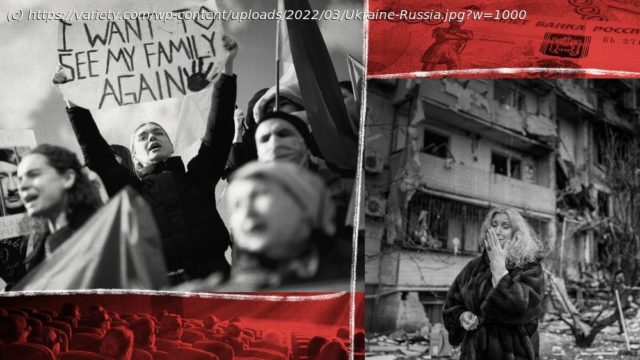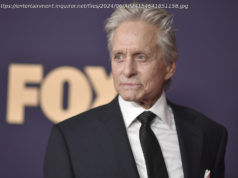The international media industry has mobilized on an unprecedented scale to protest against the Russian invasion of Ukraine.
The upcoming Vilnius International Film Festival (March 24-April 3) has announced it will implement a total boycott of Russian cinema by refusing to screen any and all Russian films, as well as projects at its market side, in solidarity with Ukraine and welcoming the appeal made by the Ukrainian Film Academy for a total boycott. “We must do everything we can to help our brothers and sisters in Ukraine,” said the fest’s artistic director Algirdas Ramaska, who noted: “With the boycott, the festival has taken a stand without any compromise.” “Films inspire us to define the difference between good and evil. Let’s be curious, ask ourselves what our role in this tense world is,” he added, underlining that Lithuania –– which was the first Soviet republic to declare independence in 1990 –– is “not afraid to speak up.” – Nick Vivarelli The San Sebastian International Film Festival has expressed solidarity with Ukraine and said it will not ban “dissident” Russian filmmakers from the festival. “[O]ur selection processes evaluate films on an individual basis, never on the basis of their nationality, even when they come from countries with governments that violate fundamental rights, and we will continue to do so in these turbulent times,” the festival said in a statement. “We cannot make all the citizens of a country responsible for the decisions of their governments. Often, as is the case of the thousands of Russian citizens who have taken to the streets in protest against the war, these citizens not only disagree with their government’s decisions, but also fight against them.” “Those Russian voices that oppose the aggression committed by their country will always have a place at the San Sebastian Film Festival. We would like to end by expressing our desire for the re-establishment of international law and peaceful stability in the zone with a view to guaranteeing the wellbeing of the Ukrainian population.” – K.J. Yossman Leading Ukrainian media organizations 1+1 media, StarLight Media, Media Group Ukraine and Inter Media Group alongside the Ministry of Culture and Information Policy of Ukraine and NGO Detector Media, have written an open letter to Ursula von der Leyen, president of the European Commission, and Vera Jourova, VP of the European Commission, calling on the ban of all Russian satellite channels in the EU and broadcast Ukrainian TV instead. “Russian TV channels are justifying the Russian war against Ukraine in their multiple news stories, they are withholding the truth about the real scale of the military actions and their own losses, they are discrediting Ukrainian authorities and international partners, undermining with such actions democratic values and principles and questioning freedom of speech as the basis of European values, and also generating an enormous amount of fake news, thus deceiving their audience not only in the Russian Federation, but also in the EU countries and in the United States of America,” the letter said. The Tokyo International Film Festival, which in 2019 screened Ukrainian films “Atlantis” and “The Painted Bird,” has called for a peaceful resolution to the ongoing crisis in Ukraine. “The Tokyo International Film Festival expresses its deep concern over this situation, in which people’s lives and their rich culture, including films, are now in jeopardy,” the festival said in a statement on March 11. “As an organization that aims to contribute to the promotion of global friendship and culture through cinema, the Tokyo International Film Festival feels the hardships of those affected by the crisis as our own and is committed to supporting the films and art produced by them, regardless of national borders.” “For these reasons, we strongly call for a peaceful resolution to this crisis as early as possible.” “The Tokyo International Film Festival will explore what measures should be taken at our 35th edition in October-November this year,” the statement added. The U.K. government has imposed sanctions on Russian oligarch Roman Abramovich, the owner of Premier League soccer club Chelsea FC. Abramovich had put the club up for sale recently, with net proceeds from the sale going to a charitable foundation in aid of Ukraine war victims. Under the terms of the sanction, Abramovich sees his assets frozen, a prohibition on transactions with U.K. individuals and businesses, a travel ban and transport sanctions imposed. “Putin’s attack on Ukraine continues & we are witnessing new levels of evil by the hour. Today the Government has announced further sanctions against individuals linked to the Russian Government. This list includes Roman Abramovich, the owner of Chelsea Football Club,” U.K. Culture Secretary Nadine Dorries tweeted on March 10. “Our priority is to hold those who have enabled the Putin regime to account. Today’s sanctions obviously have a direct impact on Chlesea & its fans. We have been working hard to ensure the club & the national game are not unnecessarily harmed by these important sanctions,” Dorries said. “To ensure the club can continue to compete and operate we are issuing a special licence that will allow fixtures to be fulfilled, staff to be paid and existing ticket holders to attend matches while, crucially, depriving Abramovich of benefiting from his ownership of the club.” “I know this brings some uncertainty, but the Government will work with the league & clubs to keep football being played while ensuring sanctions hit those intended. Football clubs are cultural assets and the bedrock of our communities. We’re committed to protecting them,” Dorries added. The International Coalition for Filmmakers at Risk, the partnership established by the International Documentary Film Festival Amsterdam, the International Film Festival Rotterdam and the European Film Academy to act as the film community’s collective response to cases of filmmakers facing severe risk, has set up an emergency fund for filmmakers aimed at film practitioners directly in danger due to the ongoing war in Ukraine. The fund aims to help filmmakers with small grants of €500 ($544), €1,000 or €1,500 to cover temporary relocation expenses, legal and administrative fees and other minor but necessary expenses required during the current situation. Filmmakers at risk can reach out directly to the fund through contact@icfr.international. Financial contributions have been already pledged by Germany’s key national and regional film funding bodies and by many individual donors. Korea’s Jeonju International Film Festival has condemned the Russian invasion of Ukraine. “As a member of our community, and the international community, which has suffered from the infringement of sovereignty, Jeonju International Film Festival strongly condemns the Russian invasion of Ukraine. This kind of violence cannot be justified in any circumstance,” the festival said in a statement. “Jeonju International Film Festival strongly supports and respects Ukraine’s will to protect its sovereignty, territory, and democracy, and also supports the courage of local Russian filmmakers, artists, and people who have begun to speak out against the unilateral decision of the nation. We hope citizens in Ukraine stay safe,” the statement added. Nordisk Film TV Denmark, a Banijay Nordic label, will produce fundraising concert Together for Ukraine, which will take place at City Hall Square in Copenhagen March 12 and will be shown on big screens across Denmark’s major cities: Aarhus, Odense, Aalborg and Esbjerg. The concert will be broadcast live on DR1 and TV 2. Well-known Danish musicians will perform and viewers will have the chance to donate funds to aid agencies both before, during and after the event. Meanwhile, Banijay Benelux label TVBV will produce a fundraising show, in collaboration with ITV and NOS, for Giro555’s Together in Action for Ukraine campaign to be broadcast on March 7 on SBS6, RTL 4 and NPO1. Hosted by Chantal Janzen and Rob Kemps, the show will also feature Dionne Stax, Britt Dekker and Hila Noorzai. Ukrainian actor Pasha Li was killed on March 6, during Russian shelling in Irpin. He was 33 years. Lee had enlisted in the Ukraine army’s Territorial Defense Forces. Lee was a well-known film and dubbing actor, singer and composer. He was active in Kyiv’s Koleso theater and starred in films and commercials. Film credits include Valentyn Vasyanovych’s “The Pit” (2006), Lyubomyr Levytsky’s “Shadows of Unforgotten Ancestors,” “Zvychayna sprava” (2012), also by Valentyn Vasyanovych, Oleksey Shaparev’s “The Fight Rules” (2016) and Valentyn Shpakov’s “Meeting of classmates” (2019) among others. One of his last works was television series “Provincial” (2021). The Polish Film Institute has condemned the Russian invasion of Ukraine and has called for specific actions to be taken. These include asking the Council of Europe to exclude Russia from Eurimages and to terminate its co-production agreements with it, and to exclude the Russian Federation from the European Convention on Film Co-production; the International Association of the Federation of Film Producers (FIAPF) to remove the FIAPF accreditation from the International Film Festival in Moscow; producers to terminate their cooperation with economic entities of the Russian Federation and not to transfer intellectual property rights to films in the territory of the Russian Federation; distributors not to license the distribution of films in the territory of Russia; Streamers and VOD platforms to ban content on their resources which was created or co-produced by Russian filmmakers; and festivals for the exclusion of films produced by or in co-production with the Russian Federation. “We must realize that Ukraine, as a country attacked by a ruthless aggressor, facing the incredible atrocities of the Russian Federation, is now acting as a dam against the attack on the freedom of the whole of Europe.
Домой
United States
USA — Cinema Russia's War in Ukraine: Vilnius Film Festival Will Boycott All Russian Films...






